Trout Among Dragons
April 15, 2021



 Fishing,SCA Articles
Fishing,SCA Articles
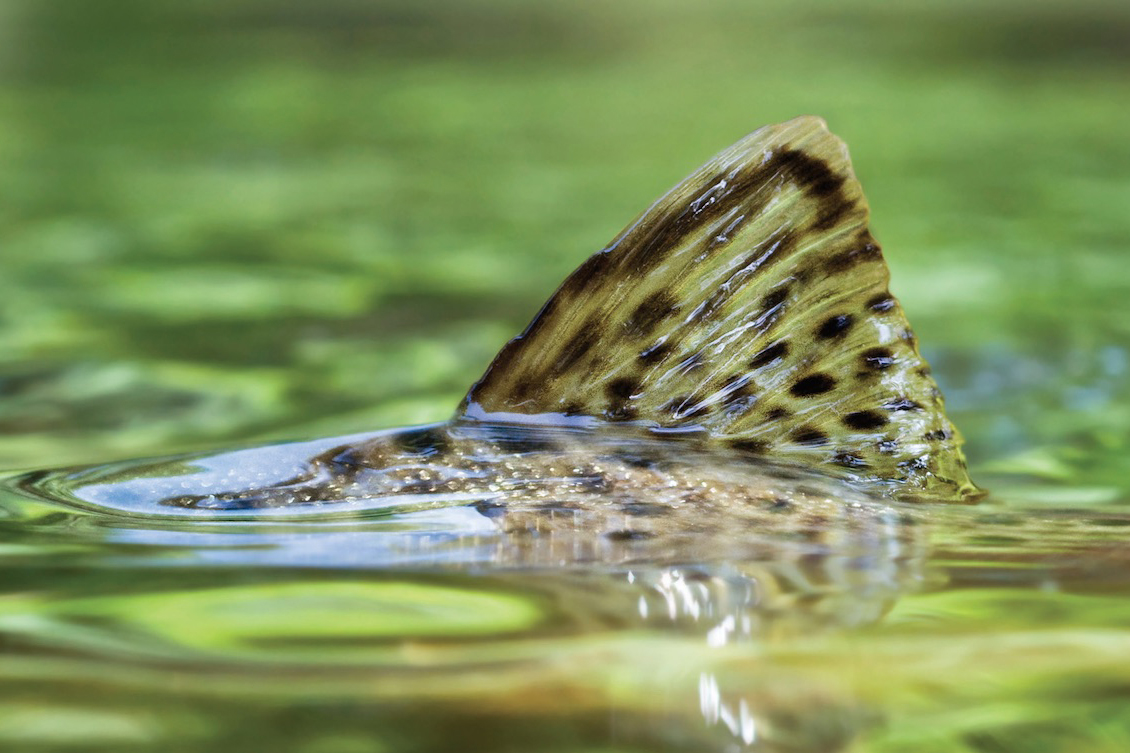
A father-son adventure in Bhutan delivers lasting memories.
The air buzzed as a steady wind whipped hundreds of Buddhist prayer flags embossed with Tibetan script strung by faithful pilgrims across 13,000-foot Chelela Pass. After nearly two hours in the car, climbing slowly through evergreen forests and rhododendron groves along the twisted highway from Thimpu, the capital of Bhutan, my 78-year-old father and I needed this break. Coming switchbacks led to the Haa Valley, an unlikely destination for the few anglers in South Asia who have a notion to cast to the wild brown trout in nearby streams. Dad and I had just spent a week watching birds and visiting temples in central Bhutan with my wife and daughter. I had already seen fish rising a few times but had not wet a line. With a little luck, that was about to change.
Hidden beyond the natural fortress of the world’s highest mountains, Bhutan boasts a breathtaking nickname, the Land of the Thunder Dragon, and even visitors who can handle the altitude will find their pulse quickened by the scenery. Travelers knowledgeable about this landlocked, Switzerland-sized nation perched between China and India often talk about how development-wise tiny Bhutan has embraced eco-friendly Gross National Happiness over Gross National Product. It’s not a perfect system, but elected officials have helped ensure that 70 percent of the nation is still covered by virgin forest, its mountains populated by globally endangered species such as the snow leopard, Bengal tiger, red panda and black-necked crane, a four-foot-tall bird with dramatic black-and-white markings that nests on the Tibetan plateau.
Naturally, brown trout are not part of the native mix that makes up these alpine woodlands, but their reliance on cold, clear unpolluted streams means that generations after Salmo trutta were first introduced, trout still thrive in Bhutan.
Rumors of these fish set me scheming in 2015 when my wife, Christina, and I first hatched the plan of a multi-generational overseas voyage with our daughter and her grandfather. In the decades since Dad introduced me to the pastime of flyfishing, I have spent a substantial portion of my adult life globetrotting with various travel rods and tackle in my kit— finding productive waters in Kashmir and other corners of India. After we enjoyed a temple festival celebrating the cranes, I hoped to enjoy some father-son bonding on the Haa River, which traces a narrow path across western Bhutan.
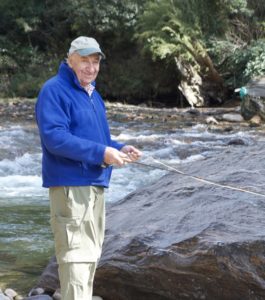
We had dropped Christina and my daughter, Ursula, in the capital city of Thimpu, which has less than a million residents and no traffic lights. Christina’s career as a documentary linguist first led us to the Himalayas, and she now stayed in the city to conduct academic research. With silky clouds stretched across the gunmetal sky, our guide, Ratu Drukpa, encouraged Dad and me to return to the car for our descent from Chelela Pass.
I had met Ratu on a previous adventure, trekking to remote villages in Bhutan’s southern highlands, where we encountered the rare golden macaque monkey. Having shown me iPhone pictures of a couple of beefy two-pound rainbows landed on a glacier-fed Punakha River, Ratu tipped me off to the Haa—explaining that fishing permits would be easier to get for the remote area.
Rolling down toward the rustic guesthouse where we would stay two nights, the swift Haa appeared bounded by woodlands and terraced rice fields. Dark pools and sparkling riffles whetted my optimism as did several easy access points; my father remained an intrepid soul in the twilight of his 70s, but his agility was fading.
With daylight fading as well, we made a brief stop at the local fish hatchery where rainbow trout are reared as part of an aquaculture program in the Haa district. As explained to us, some farmers divert water from area streams into fish ponds they maintain as an easy source of protein in these secluded hills. Bhutan however prohibits the release of rainbows into the same waters as the brown trout. The brown trout have had friends in high places since they were introduced by the hereditary monarch King Jingme Wanchuck in the 1930s, borrowing seed stock from India next door.
The British held India as a colony through World War II, but Bhutan— as locals proudly remind tourists—had never been taken over by a foreign ruler.
Despite their foreign provenance, the feisty brown trout, originally protected by royal caveat, now struck me as stand-ins for our small, fiercely independent host nation. Not that a leaping rainbow would have disappointed, but in the shadows of massive peaks that many Buddhists still view as heaven on earth, I could not escape a deeply idiosyncratic impulse to target wild, naturally propagating fish. After all, if I wanted to cast to streams stocked with rainbows, I could have flown to Colorado.
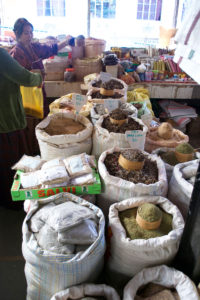 Following dinner and a detour to dreamland, in the morning we headed out to fish a quiet stretch maybe five miles up the road from the hotel, past a big military training center with a helipad and some patriotic paintings along the roadside.
Following dinner and a detour to dreamland, in the morning we headed out to fish a quiet stretch maybe five miles up the road from the hotel, past a big military training center with a helipad and some patriotic paintings along the roadside.
The river was too low for a float, so I unfurled my waders while Dad changed into some quick-drying pants. It was a cool morning, and the fact remained that, although my father still gets around, he didn’t want to wade in too deep.
Ratu, who had been dressed like most Bhutanese in a traditional kimono-style robe called a gho, likewise had turned up at our door in sturdy outdoor gear and hiking boots.
As the golden orb of the sun pressed over the high ridge to the east, we strung our rods. My dad carried the trusty bamboo, 7-footer that has been his main rod for decades across trips to Yellowstone and elsewhere. I was armed with a 4-piece, 5-weight Scott that I picked up on eBay for our trip, along with a trusty Abel reel. My flies included terrestrials and small stimulators, and a batch of bead-head nymphs.
 I headed upstream while Ratu stationed himself along with my dad ahead of a likely looking boulder garden. There was a small bridge across the river beyond, but basically no traffic. Lively Himalayan bulbuls flew by in a noisy flock, black and yellow feathers flashing, as I crept along the bank, noting some microscopic midges floating in the air. The pools swirled dark as though a vial of ink had been poured into the waterway.
I headed upstream while Ratu stationed himself along with my dad ahead of a likely looking boulder garden. There was a small bridge across the river beyond, but basically no traffic. Lively Himalayan bulbuls flew by in a noisy flock, black and yellow feathers flashing, as I crept along the bank, noting some microscopic midges floating in the air. The pools swirled dark as though a vial of ink had been poured into the waterway.
I laid a size 16 parachute Adams on the surface, it’s tuft bounding along the current, while I awaited a strike . . . that never came. I cast again, twitching the fly, working between noon-and-two on a foreshortened cast to keep the line out of the overhanging brush. Again, I waited. Nothing. Then something.
Darting out of the depths, one, then two, three, pan-fish-sized trout followed my feathery offering. Sodden, it sank. I cast again. No takers, but definite interest.
I replaced the Adams with a blond caddis and fixed a bead-head hare’s ear, laid the line back on the water, and watched as the caddis dove bobber-like beneath the surface, the nymph doing its trick. With dark spots and a bright yellow belly, I had my first Bhutanese brown, a six-incher, but a trout nonetheless—a reward for the miles traveled.
I was able to repeat the process, pulling a 10-incher and an eight-incher from the same hole. I tried dragging a streamer, thinking the hawgs must be deeper. But that didn’t work. Adding a second dropper earned me another smallie.
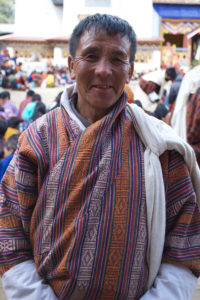 Dad was not having any luck downriver, so we switched spots and allowed the fish to settle back into a feeding rhythm as I rigged a nymph to his line. By now, an old farmer-looking gentleman in a woolen cap had taken a position across the way. At first, I thought he was watching us, but then I noticed he held a rope fixed to a float.
Dad was not having any luck downriver, so we switched spots and allowed the fish to settle back into a feeding rhythm as I rigged a nymph to his line. By now, an old farmer-looking gentleman in a woolen cap had taken a position across the way. At first, I thought he was watching us, but then I noticed he held a rope fixed to a float.
Dad caught his first fish, then another— but my attention was now fully on the spectator, who was pulling up a bottle under which swung a twine net, empty for now. The sight solved the koan of why in a neighborhood where religious leaders known as lamas promote compassion and conservation, we could not find trout of decent size. Rather than imitate the Buddha’s path to nirvana by shielding fish from pain, this omnivorous gent had been poaching dinner from the pools below his farm.
I left Ratu and my father up by the bridge and started to work my way downstream away from the road to a hairpin in the Haa River where steep granite walls blocked my view of a chasm. A raft of shallow pebbles spanned the section, and I tried throwing a fly back to where the current carved deeper cuts, keeping the line to the inside of some chunky rocks. I snagged a branch, caught another little beauty, and watched in dismay as a school of foot-long something-or-others skimmed across the shallows and out of reach. To follow them required the dexterity of a dancing monk, as I had to climb a shaky logjam to find a decent path.
Holding my rod high, I stepped lightly, using a submerged rock as a stair. I didn’t want to take a dunk and didn’t want to end up at the Army Hospital at the nearby base of the Indo-Bhutan mountain troops. But the Land of the Thunder Dragon had another fate in store for me. Suddenly, I felt a loud crack as the makeshift log bridge shattered beneath my boots, and I plunged chest-deep into the drink. Though I made a splash, I was surprised to find myself—and my gear—still intact.
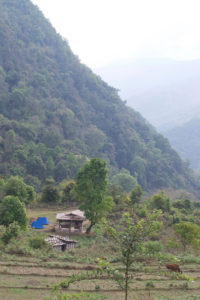 Call it instant karma, call it what you will . . . we had been ripping lips for a few hours, but the fishing slowed as lunchtime arrived. The river had delivered enough trout to repay the effort to get there, and my fall struck me as the delivery of a second verdict.
Call it instant karma, call it what you will . . . we had been ripping lips for a few hours, but the fishing slowed as lunchtime arrived. The river had delivered enough trout to repay the effort to get there, and my fall struck me as the delivery of a second verdict.
Fishing can be a form of meditation, or as I read in the Tibetan Book of the Dead: “When I experience suffering as the result of negative past actions, may the meditational deities dispel all such misery.”
In other words, embrace the now. For my father, looking back, the black-necked cranes, rare herons and exotic sights of the holy dzongs of Bhutan, temples where the religious and civic rulers express their devotion, made the biggest impression. This much was apparent as we sat over a quiet dinner at the hotel, and the fishing expedition had been but a modest bonus. For me, though, our journey—from exploring the Himalayas with my daughter, to an anticipated shopping spree in Thimpu on our return—felt like a momentous brass-ring way to seize the day. In turn, catching those wild brown trout offered me the prize of fishing with Dad before the eternal mountains call him away.
